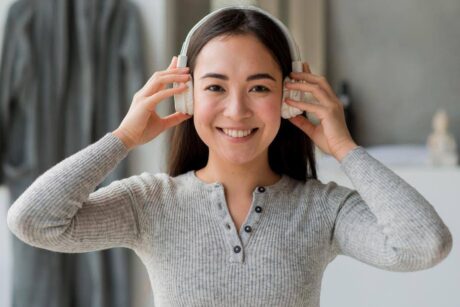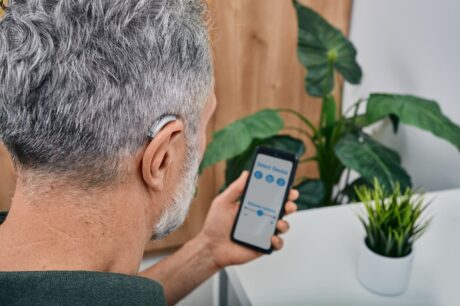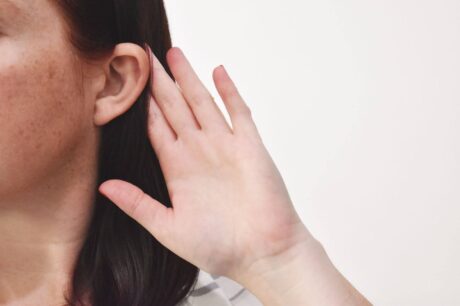Living with hearing loss doesn’t mean giving up on an active lifestyle. You can still participate in various activities, from driving and yoga to even competitive sports. In fact, some individuals with hearing loss have excelled in athletics, such as Miss Chui Yee Shia, crowned Miss Singapore in 2013.
While playing sports with hearing aids might seem challenging due to constant movement, it’s entirely possible with the right precautions. Let’s explore tips and best practices for safely enjoying sports while wearing hearing aids.
Choosing the Best Hearing Aids for Athletes
The ideal hearing aid for sports depends on the specific activity. Different types of hearing aids offer different advantages that can be tailored to your athletic pursuits. Discuss your chosen sport with your audiologist to determine the best fit for your needs.
In-the-Ear (ITE) Hearing Aids
- Protection from Elements: ITE hearing aids are less exposed to wind and rain, reducing the risk of damage.
- Secure Fit: They fit snugly within the ear canal, making them less likely to fall out during vigorous activity.
- Discreetness: ITE hearing aids are less visible, which may be preferable for some athletes.
Behind-the-Ear (BTE) Hearing Aids
- Attachment Options: BTE hearing aids can be secured to clothing with clips or bands, providing extra protection against loss.
- Versatility: With the right protective accessories, BTE hearing aids can be suitable for a wide range of sports.
- Durability: BTE hearing aids are generally more durable than ITE hearing aids, making them a good choice for high-impact sports.
Hearing Aid Protection During Sports
Moisture, whether from swimming or sweat, poses a significant risk to hearing aids. Choosing water-resistant hearing aids or utilising hearing aid moisture protection accessories can help safeguard your devices during physical activity.
Listening Lab’s current range of devices boasts an IP68 waterproof rating, equivalent to many modern smartphones. This means they can withstand submersion in water for a certain period.
For activities that induce sweating, sweat-proof hearing aids or sweat-resistant hearing aids are recommended. Consider using a hearing aid sweatband to wick away moisture and secure the device to your clothing, minimising the risk of damage or loss.
Waterproof and Water-Resistant Hearing Aids
Waterproof hearing aids are designed to be fully submerged in water without sustaining damage. Water-resistant hearing aids, on the other hand, can tolerate exposure to moisture but may not be suitable for swimming or other water sports. It’s crucial to choose the right level of water resistance based on your chosen activity.
Sweat-Proof and Sweat-Resistant Hearing Aids
Sweat-proof hearing aids are designed to resist the corrosive effects of sweat, while sweat-resistant hearing aids offer some protection but may require additional precautions. Sweatbands and drying kits can help manage moisture and extend the lifespan of your hearing aids.
Practical Tips for Playing Sports with Hearing Aids
1. Communicate with Your Team
Inform your coach, teammates, and referees about your hearing loss and whether you’ll be wearing your hearing aids during the game. This ensures they are aware of your needs and can make necessary adjustments, such as using visual cues or hand signals.
2. Learn Hand Signals and Visual Cues
Many sports incorporate hand signals and visual cues to communicate information. Familiarise yourself with these signals to stay informed about the game, even in noisy environments.
3. Use Protective Gear
Utilise protective gear like helmets, headbands, or hearing aid sweatbands to secure your hearing aids and shield them from impact and moisture.
Specific Recommendations for Different Sports
Running and Outdoor Sports
Engaging in running or outdoor sports demands hearing aids that can withstand the elements. Prioritise sweat-resistant hearing aids or models with an IP rating of 54 or higher to protect against moisture damage. Secure your devices with hearing aid sweatbands or clips to prevent them from falling out during vigorous movement. Consider water-resistant covers for additional protection against rain or splashes. If you frequently participate in high-impact sports, explore behind-the-ear (BTE) options with robust build quality to withstand potential bumps and jolts.
Swimming
For avid swimmers, choosing waterproof hearing aids for swimming is essential. Look for devices with a high IP rating, preferably 68, which indicates complete protection against dust and prolonged immersion in water. Ensure your chosen model is specifically designed for swimming and adheres to the manufacturer’s guidelines regarding water exposure and depth limits. After swimming, promptly dry your hearing aids thoroughly using a dehumidifier or drying kit to maintain their functionality and longevity.
Team Sports
Effective communication is crucial in team sports. Opt for hearing aids with secure fittings and reliable retention, such as in-the-ear (ITE) models or BTE hearing aids with clips or headbands. Utilise hearing aid sweatbands to protect your devices from sweat and potential impacts during gameplay. Consider using accessories like T-coils for direct streaming of audio signals from compatible assistive listening devices, enhancing communication on the field.
Conclusion
With the right precautions and equipment, playing sports with hearing aids can be a safe and enjoyable experience. By choosing the appropriate hearing aids, utilising protective gear, and communicating effectively with your team, you can stay active and competitive while prioritising your hearing health. If you’re seeking hearing aids suitable for an active lifestyle, browse our selection at Listening Lab today.
About The Listening Lab
Listening Lab is a home-grown company whose mission is to help our clients restore their hearing to enjoy the life that they desire. Experiencing hearing loss can be detrimental to one’s quality of life. Hence we commit to providing high-quality hearing solutions.
Our hearing solutions include hearing tests and treatment and prescribing hearing aids. Clients may come to get their hearing checked, and we will assess whether hearing aids are required.
If hearing aids are required, clients can choose from a variety of the best hearing aid brands we provide. Each of the products offers unique features that complement daily use and perform well in helping our clients enjoy the life that they desire.








